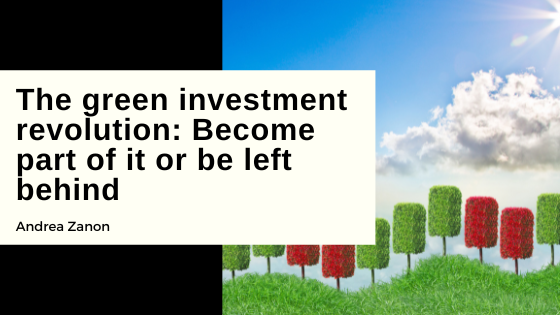New research from global investment firms shows that over 50% of the population and investors want green tech and sustainable programs going forward. As the markets and society deal with Russia, Rates, and the Recession (the 3 Rs), there are clear signs that people want more sustainability integrated into decisions and investments. Having said that, the overall climate movement will suffer in 2022 as countries are dealing with short term financial decision making that are not in line with the green transition. This includes reliance on coal for energy generation, postponing clean-tech and renewable energy projects, and delaying new legislation like the EU Green Deal.
The trend
Regardless of the ongoing economic crunch, everybody in the public and private sector is embracing green sustainable growth and Environmental Social and Governance (ESG). While this may seem politically motivated and left-wing leaning, it is not, and everyone should pay attention as the cost of not acting now on the green transition, will affect companies’ competitiveness, relevance, and market positioning. This argument is based on the overall assessment that regardless of the climate change and climate variability merits, reducing the carbon intensity of our economies and building resiliency saves money and prevents damage and losses caused by disaster events. Those that invest in sustainability and clean tech now are going to be able to join the “first mover coalition” that is building the new industrial, digitally based economy of the future. Those that stay behind and lobby for the status quo to avoid more disclosure, accountability and ESG scoring are missing the point and missing the boat.
A few facts on the climate challenge and actions been taken
- Physical damage to assets and economic losses due to natural disasters tripled over the last 20 years globally. In the US disaster events (floods, cold fronts, megadroughts, and wildfires) are costing the economy 2 percent of national GDP (that is approximately US$ 250 billion per year).
- Unless decarbonization is dealt with, by 2050 Climate Change could cause $23 trillion in global GDP losses (in 2020 the global GDP was US$ 84,5 trillion), corresponding to 11 to 14 per cent off global economic output.
- Investing in resilience pays off and you don’t have to pay more to shift your investment to prevention. The World Bank estimates that investing 1 dollar in resilience equals at least 20 dollars spent in emergency reactive response.
- Policy makers and regulators are coordinating their efforts to address climate data gaps, risk of corporate greenwashing, multiple disclosure standards, and a lack of globally accepted taxonomies in implementing investment strategies that support the transition to a greener society and economy.
- More than 60% of these younger consumers expressed interest in investing in companies that take ESG and sustainability seriously.
Conclusion
The risk and vulnerability to disruptive events influenced by climate have convinced politicians and the markets that making our environment better creates massive value for companies and for society. In so doing, the market is rewarding those earlier movers’ companies and entrepreneurs that can shift gear rapidly, establishing unique partnership and testing new technologies with a lower carbon intensity. Funding and investment will continue to flow to sustainable investments and to entrepreneurs as our society get transformed away from obsolete business practices that are no longer acceptable for most consumers and investors.

